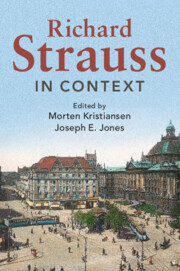Book contents
- Richard Strauss in Context
- Composers in Context
- Richard Strauss in Context
- Copyright page
- Contents
- Figures
- Notes on Contributors
- Preface
- Note on Translation
- Part I Family, Friends, and Collaborators
- Part II Career Stations
- Part III Cultural Engagement and Musical Life
- Part IV Professional and Musical Contexts
- Chapter 19 The Composer
- Chapter 20 The Conductor
- Chapter 21 The Orchestra
- Chapter 22 Program Music
- Chapter 23 Post-Wagnerian Opera
- Chapter 24 The Lied
- Part V In History
- Part VI Artifacts and Legacy
- Further Reading
- Appendix: Letters Bibliography
- Index
Chapter 19 - The Composer
from Part IV - Professional and Musical Contexts
Published online by Cambridge University Press: 08 October 2020
- Richard Strauss in Context
- Composers in Context
- Richard Strauss in Context
- Copyright page
- Contents
- Figures
- Notes on Contributors
- Preface
- Note on Translation
- Part I Family, Friends, and Collaborators
- Part II Career Stations
- Part III Cultural Engagement and Musical Life
- Part IV Professional and Musical Contexts
- Chapter 19 The Composer
- Chapter 20 The Conductor
- Chapter 21 The Orchestra
- Chapter 22 Program Music
- Chapter 23 Post-Wagnerian Opera
- Chapter 24 The Lied
- Part V In History
- Part VI Artifacts and Legacy
- Further Reading
- Appendix: Letters Bibliography
- Index
Summary
This chapter examines the profession of music composition during Strauss’s lifetime, noting his success relative to that of his contemporaries while highlighting the many professional difficulties and economic hardships faced by aspiring and established composers alike during the period. Limited performance opportunities, unfavorable publishing and copyright terms, disappearing avenues of patronage, and a lack of standardized credentialing processes or conservatory curricula for composers all contributed to a rather bleak state of affairs for the average composer. The figure of the composer was a complex one during Strauss’s long life, trapped between the nineteenth-century ideal of unfettered inspiration and the often-ugly economic and social reality of the twentieth. Led by Strauss, German composers sought to professionalize their discipline – albeit largely unsuccessfully – seeking reforms in music publishing, copyright, and music education that would place them on a more secure economic footing.
- Type
- Chapter
- Information
- Richard Strauss in Context , pp. 173 - 181Publisher: Cambridge University PressPrint publication year: 2020

